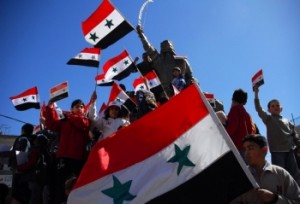 The world's chemical weapons watchdog has begun on Saturday to examine details of Syria's chemical arsenal supplied by the regime, as rebels agreed a truce with jihadists in a key border town.
The world's chemical weapons watchdog has begun on Saturday to examine details of Syria's chemical arsenal supplied by the regime, as rebels agreed a truce with jihadists in a key border town.China urged a quick implementation of a landmark US-Russian deal to destroy Syria's chemical stockpile, as the Hague-based Organisation for the Prohibition of Chemical Weapons (OPCW) tasked with dismantling the weapons said it has received an initial report from President Bashar al-Assad's regime on the arsenal.
In New York, UN envoys were due to resume talks on a draft Security Council resolution that would enshrine the plan to neutralise the lethal weapons.
On the ground, rebels agreed a truce with jihadists in a key border town, while a senior Syrian official said Damascus wanted a ceasefire in the 30-month war, which has killed more than 110,000 people and forced more than two million to flee.
Chinese Foreign Minister Wang Yi said Beijing would "support the early launch of the process to destroy Syria's chemical weapons".�
He also called for a proposed peace conference in Geneva to take place "as soon as possible".
"We believe that a political settlement is the only right way out in defusing the Syrian crisis," he added.
The US-Russian plan to dismantle the chemical arms stockpile has helped prevent US-led military action following a chemical attack last month that killed hundreds of people and which Washington blames on the regime.
Under the plan, Assad's regime had until Saturday to supply details of its arsenal.
On the eve of the disclosure deadline, the OPCW said it "has received an initial disclosure from the Syrian government of its chemical weapons programme."
Its Technical Secretariat is now examining the details, it said.
A UN diplomat said the OPCW had received the Syrian declaration on Thursday. "It is quite lengthy," he said.
The OPCW has postponed a meeting of its Executive Council set for Sunday that had been due to discuss how to dismantle Syria's chemical weapons programme.
Russia and the United States had brokered the deal which stipulates that the regime hand over the chemical weapons and facilities, which would be destroyed by mid-2014.
US Secretary of State John Kerry said he and his Russian counterpart Sergei Lavrov spoke on the telephone Friday about a "strong" UN Security Council resolution on the deal.
"We talked about the cooperation which we both agreed to continue to provide, moving not only towards the adoption of the OPCW rules and regulations, but also a resolution that is firm and strong within the United Nations," Kerry said.
"We will continue to work on that," said Kerry.
The Security Council's five permanent members -- the United States, China, Russia, France and Britain -- have been wrangling over the text of the resolution since Monday in a bid to find common ground.
Russia, a key ally of Damascus, opposes all references to a possible use of force as sanction for non-compliance.
Meanwhile, jihadist rebels fought fiercely for the town of Azaz on the Turkish border before seizing it Wednesday from mainstream Free Syrian Army (FSA) rebels.
The move by Al-Qaeda front group the Islamic State of Iraq and the Levant (ISIS) triggered the ire of the National Coalition opposition group.
It issued a rare condemnation of ISIS, accusing the jihadists of violating the principles of the anti-Assad uprising.
The Syrian Observatory for Human Rights said that the Northern Storm brigade loyal to the FSA has agreed to a truce with ISIS.
Liwa al-Tawhid, another brigade loyal to the FSA, brokered the deal and sent fighters to deploy between the two sides in Azaz, the Observatory said.
Symbolic and strategic
Azaz has both symbolic and strategic value as it was one of the first towns to be captured from government troops, in July 2012, by the FSA which set up its own administration.
Tensions have spiralled between some mainstream rebel groups and ISIS in recent months, especially in northern Syria, where the opposition controls vast swathes of territory.
Deputy Prime Minister Qadri Jamil said the war is now in stalemate and Damascus would call for a ceasefire if long-delayed peace talks in Geneva take place.
"Neither the armed opposition nor the regime is capable of defeating the other side," Jamil told Britain's Guardian newspaper.
Asked what his government would propose at the stalled Geneva II summit, he replied: "An end to external intervention, a ceasefire and the launching of a peaceful political process."
French President Francois Hollande, who has taken a strident stand against Damascus, is to meet his Iranian counterpart on the sidelines of the UN General Assembly next week, Hollande's office announced Friday.
The meeting on Tuesday between Hollande and Iranian President Hassan Rouhani would focus on the Syrian conflict as well as Iran's nuclear programme.
"What we want to see is an Iran fully engaged, like other players, in the search for a real political transition in Syria," an aide to Hollande said.
Rouhani, whose country is a close ally of the Assad regime, has offered to broker talks between the Syrian opposition and the Damascus regime.
By AFP
The Iran Project is not responsible for the content of quoted articles.










